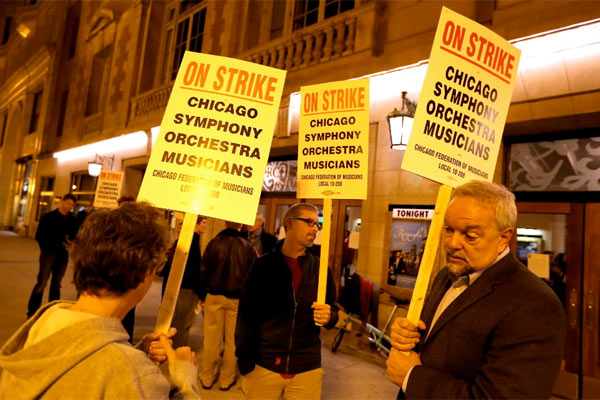
It’s been barely a week since the teacher’s strike ended, and another labor dispute is already rippling through the city. Members of the Chicago Symphony Orchestra walked out on their Saturday night performance this weekend to protest changes in salary and healthcare costs in their most recent contract. Here are the basics of the strike.
1. It’s (mostly) about healthcare.
The five-year contract that expired on September 16 offered $2,785 per week (about $144,000 per year). The CSO Association is offering a wage increase of about 4.5% over the next three years (as opposed to the 25 percent increase over five years members saw in their last contract). The new salary would increase to $2,795 (per week) in the first year, $2,835 in the second year, and $2,910 in the third year, according to the Chicago Tribune. However, the increase in salary is meant to offset major increases in health care contributions (from 5 to 12 percent), and with only a 4.5 percent wage increase, most members won’t see much of a raise at all. Stephen Lester, an orchestra bass player and head of the members committee negotiating the contract on behalf of the orchestra, told the Tribune that there’s no reason to change health insurance policies. “We have not seen substantial increase even in our health care costs over what they were 10 years ago. Those numbers have remained relatively flat. There may be other issues, but the musicians are not responsible for (them).”
Deborah Rutter, the head of the CSO Association, countered that CSO members are already paid more than most orchestra members in the country. In fact, Rutter said, when overtime is factored in, the average yearly salary is more like $173,000 (more of the CSO’s position can be found on their website. Lester told the Tribune this number is unfair since it averages the salary of the high-paid principal musicians with the much lower salary of many other members.
2. They’re meeting again Monday.
WFMT's Andrew Patner reported that the orchestra association, the federation of musicians, and a mediator will meet again today to try and finalize a contract. If that doesn’t happen, though…
3. The rest of the season is in jeopardy.
The CSO’s two rehearsals tomorrow are already in danger of not happening if a deal is not reached, but the big test will be Wednesday’s ticketed event, “Muti Conducts Respighi.” Concertgoers can exchange tickets or request a refund if the Wednesday show is canceled. Also on the horizon: Saturday’s Symphony Ball, the annual fundraiser gala that would be a huge blow to the CSO if canceled.
4. Symphony strikes are actually happening all over.
It’s not just the CSO. The Atlanta Symphony Orchestra is “locked out”, and has until its October 4 season opener to settle the contract dispute or else start canceling productions. The Indianapolis Symphony, meanwhile, has already canceled three weeks of its 2012/13 season amid contract disputes. Hopefully all these groups can come to a conclusion soon.
Photograph: Chicago Tribune


